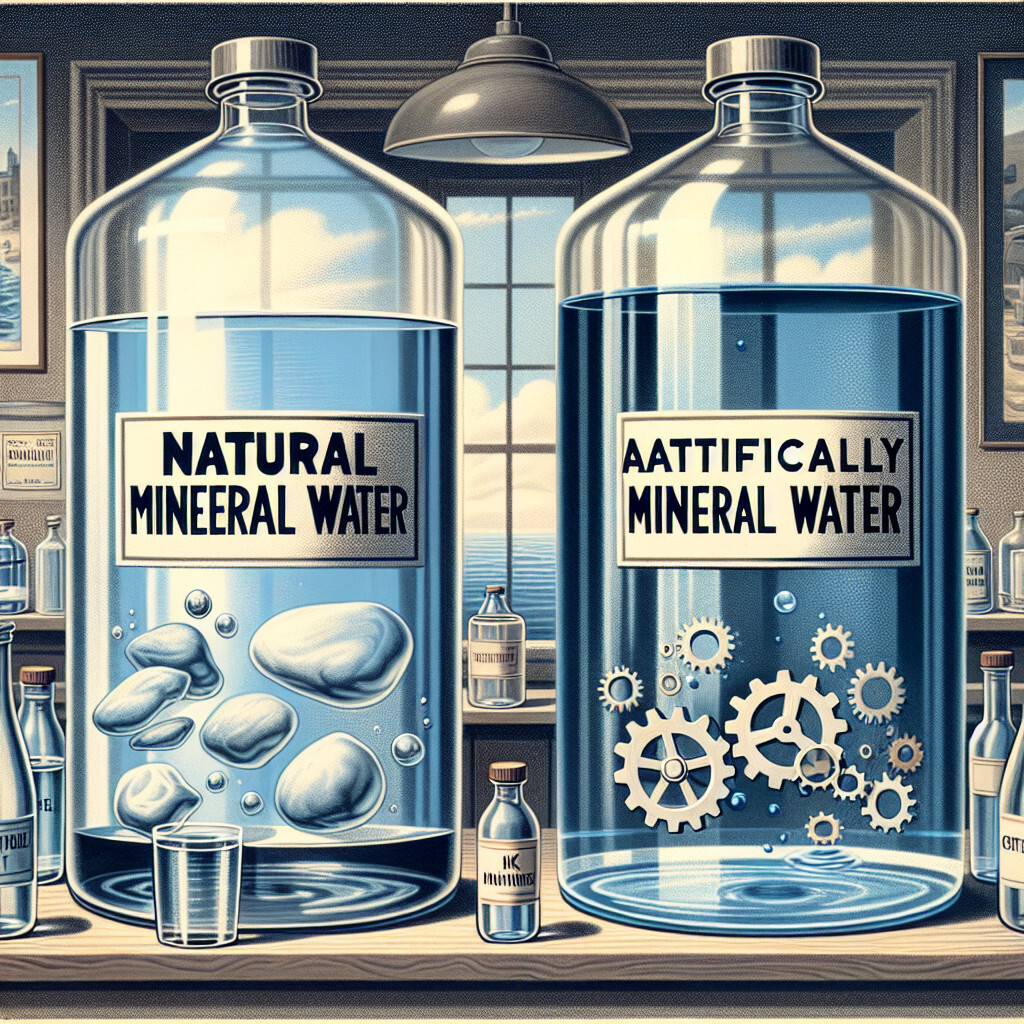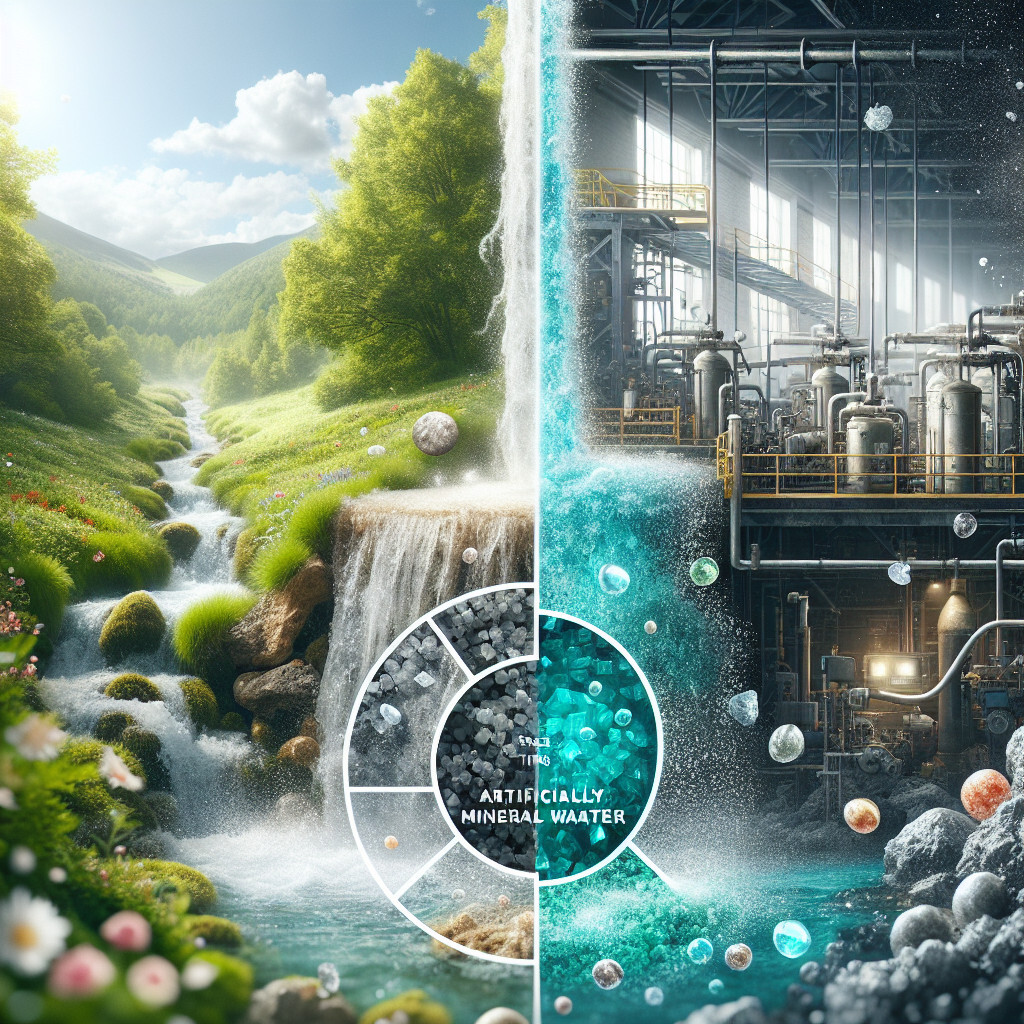-
Table of Contents
- Introduction
- Understanding the Difference between Natural and Artificially Fortified Mineral Water
- The Health Implications of Natural vs. Artificially Fortified Mineral Water
- The Science Behind Natural and Artificially Fortified Mineral Water
- The Environmental Impact of Natural and Artificially Fortified Mineral Water
- The Taste Test: Comparing Natural and Artificially Fortified Mineral Water
- Q&A
- Conclusion
“Natural vs Fortified Mineral Water: Nature’s Purity or Enhanced Hydration?”
Introduction
Natural mineral water and artificially fortified mineral water are two types of water that are differentiated based on their mineral content. Natural mineral water originates from underground reservoirs and springs, and it naturally contains various minerals like calcium, potassium, and magnesium. On the other hand, artificially fortified mineral water is typically purified water that has been artificially enhanced with minerals during the bottling process. While both types offer mineral benefits, the source and process of mineralization differ significantly.
Understanding the Difference between Natural and Artificially Fortified Mineral Water

Understanding the difference between natural and artificially fortified mineral water is crucial, especially for health-conscious individuals who value the quality of their hydration sources. The two types of mineral water may seem similar at first glance, but they have distinct characteristics that set them apart.
Natural mineral water, as the name suggests, is water that naturally contains minerals. It is sourced from underground reservoirs and springs, which are often located in geologically active areas. These areas are rich in various minerals like calcium, magnesium, and potassium, which are absorbed by the water as it flows through the earth’s layers. The mineral content of natural mineral water can vary greatly depending on its source, but it is always free of added chemicals and treatments. This type of water is often bottled at the source to maintain its purity and mineral content.
On the other hand, artificially fortified mineral water is typically regular water that has been treated and enhanced with minerals. This process is done in a controlled environment, where specific minerals are added to the water in precise amounts. The goal of fortification is to mimic the mineral content of natural mineral water or to enhance the water with specific minerals for health benefits. For instance, some brands may add extra calcium for bone health or magnesium for heart health.
The primary difference between natural and artificially fortified mineral water lies in their mineral content and how these minerals are introduced into the water. Natural mineral water contains minerals that have been naturally absorbed from the earth, while artificially fortified mineral water has minerals added during processing.
However, the difference goes beyond just the source of minerals. The taste of the water can also be affected. Natural mineral water often has a unique taste, depending on its source. This is because the water absorbs not only minerals but also other elements present in the earth, which can contribute to its flavor. In contrast, artificially fortified mineral water usually has a more consistent taste, as the minerals are added in a controlled manner.
In terms of health benefits, both types of water can contribute to your daily mineral intake. However, the bioavailability of these minerals, or how easily your body can absorb them, may vary. Some studies suggest that minerals from natural sources may be more easily absorbed by the body. However, more research is needed to confirm these findings.
In conclusion, while both natural and artificially fortified mineral water can contribute to your hydration and mineral needs, they differ in their source of minerals, taste, and potentially, the bioavailability of these minerals. When choosing between the two, consider your personal preferences, health needs, and the credibility of the brand. Always ensure that the water you consume is from a safe and reliable source, whether it’s naturally sourced or artificially fortified.
The Health Implications of Natural vs. Artificially Fortified Mineral Water
Mineral water, a popular choice for hydration, is often touted for its health benefits. It is rich in essential minerals like calcium, magnesium, and potassium, which are vital for our body’s proper functioning. However, not all mineral waters are created equal. There are two primary types: natural mineral water and artificially fortified mineral water. While both types may seem similar, there are significant differences between them, particularly in terms of their health implications.
Natural mineral water, as the name suggests, is sourced directly from natural springs. It contains minerals that are naturally present in the water, absorbed from the rocks and soil it flows through. These minerals are in their most organic form, making them easily absorbed and utilized by the body. Moreover, natural mineral water is typically free from any chemical treatment, ensuring its purity and maintaining the integrity of the minerals.
On the other hand, artificially fortified mineral water is essentially purified water that has been supplemented with minerals during the manufacturing process. While this method allows for the precise control of the mineral content, it also introduces the possibility of using synthetic or inorganic minerals. These types of minerals may not be as readily absorbed by the body, potentially reducing the health benefits of the water.
The health implications of these two types of mineral water are significant. Natural mineral water is often considered superior due to its organic mineral content. The body can easily recognize and utilize these minerals, contributing to various bodily functions such as bone health, electrolyte balance, and even cardiovascular health. Additionally, the lack of chemical treatment in natural mineral water means there is no risk of ingesting potentially harmful substances.
Artificially fortified mineral water, while still beneficial, may not offer the same level of health benefits. The synthetic or inorganic minerals used may not be as bioavailable, meaning the body may not absorb them as efficiently. This could result in less of the mineral actually being utilized by the body, potentially diminishing the health benefits. Furthermore, the process of fortifying the water could introduce other substances or contaminants, although this is heavily regulated to ensure safety.
However, it’s important to note that both types of mineral water are generally safe and healthy choices for hydration. They both provide essential minerals that can contribute to overall health. The choice between natural and artificially fortified mineral water often comes down to personal preference and availability.
In conclusion, while there are differences between natural and artificially fortified mineral water, both can be part of a healthy lifestyle. Natural mineral water may offer more readily absorbed minerals and a purer product, while artificially fortified mineral water allows for precise control over the mineral content. As with any health decision, it’s important to do your research and choose the option that best fits your individual needs and preferences.
The Science Behind Natural and Artificially Fortified Mineral Water
Mineral water, a staple in many households, is often touted for its health benefits. It is rich in essential minerals like calcium, magnesium, and potassium, which are vital for our body’s proper functioning. However, not all mineral waters are created equal. There are two primary types: natural mineral water and artificially fortified mineral water. While they may seem similar, there are significant differences between the two, particularly in how they are sourced and their mineral content.
Natural mineral water, as the name suggests, is sourced directly from natural springs. It is pure, untouched water that flows from underground sources and is naturally rich in minerals. The mineral content in natural mineral water varies depending on the geographical location of the spring. For instance, water from a spring in a mountainous region may have a higher concentration of calcium and magnesium, while water from a coastal spring may contain more sodium and chloride. This natural variation contributes to the unique taste of each brand of natural mineral water.
On the other hand, artificially fortified mineral water is typically sourced from municipal water supplies. It undergoes a purification process to remove impurities and then is artificially enriched with minerals. The advantage of this process is that the mineral content can be controlled and standardized. This means that every bottle of artificially fortified mineral water from a particular brand will have the same mineral content, regardless of where or when it was bottled.
While both types of mineral water can contribute to your daily mineral intake, there are some key differences to consider. One of the main differences lies in the bioavailability of the minerals, which refers to how easily your body can absorb and use them. Some studies suggest that the minerals in natural mineral water are more bioavailable than those in artificially fortified water. This is because the minerals in natural water are in ionic form, which is easier for our bodies to absorb.
Another difference is the presence of trace elements in natural mineral water. Trace elements are minerals that our bodies need in very small amounts. They are naturally present in spring water but are often not included in artificially fortified water. These trace elements, such as zinc and copper, play crucial roles in various bodily functions, including immune response and energy production.
Lastly, the taste of the water can also be a distinguishing factor. Many people prefer the taste of natural mineral water, which can be slightly sweet or salty depending on the mineral content. In contrast, artificially fortified water tends to have a more neutral taste, as the minerals added do not significantly alter the flavor.
In conclusion, while both natural and artificially fortified mineral waters can contribute to your mineral intake, they differ in their source, mineral content, bioavailability, and taste. Natural mineral water is a pure and natural source of minerals with potentially higher bioavailability, while artificially fortified water offers consistency in mineral content. Ultimately, the choice between the two will depend on your personal preference and health needs.
The Environmental Impact of Natural and Artificially Fortified Mineral Water
Mineral water, a staple in many households, is often touted for its health benefits. It is rich in essential minerals like calcium, magnesium, and potassium, which are vital for our overall well-being. However, not all mineral waters are created equal. There are two main types: natural mineral water, which is sourced directly from underground reservoirs and springs, and artificially fortified mineral water, which is essentially purified tap water with added minerals. While both types may seem similar in terms of their nutritional content, they differ significantly in their environmental impact.
Natural mineral water is sourced from pristine environments, often far from human habitation. These locations are carefully chosen to ensure the water is free from pollution and contamination. The water is then bottled at the source, preserving its natural mineral content. This process, while ensuring the purity and quality of the water, can have significant environmental implications. The remote locations of these sources mean that transporting the water to consumers requires a considerable amount of energy, contributing to greenhouse gas emissions. Moreover, the extraction of water from these sources can disrupt local ecosystems and deplete scarce water resources.
On the other hand, artificially fortified mineral water is typically produced closer to the point of consumption. This reduces transportation costs and associated carbon emissions. However, the process of purifying and fortifying the water also has environmental implications. It requires a significant amount of energy and can generate waste products. For instance, reverse osmosis, a common purification method, produces a brine solution that can harm aquatic life if not properly disposed of. Additionally, the minerals added to the water are often mined, which can lead to habitat destruction and pollution.
Furthermore, regardless of whether the mineral water is natural or artificially fortified, the bottling process is a significant source of environmental concern. Plastic bottles, which are the most common packaging for mineral water, contribute to the growing problem of plastic waste. Even when recycled, the process requires energy and generates emissions. Glass bottles, while more environmentally friendly, are heavier and thus require more energy to transport.
In terms of environmental impact, it’s clear that both natural and artificially fortified mineral water have their drawbacks. However, it’s also important to note that the impact can vary greatly depending on the specific practices of the water company. Some companies are making efforts to reduce their environmental footprint by using renewable energy, implementing water-saving measures, and opting for more sustainable packaging options.
In conclusion, while both natural and artificially fortified mineral water can contribute to a healthy diet, their production processes have distinct environmental impacts. As consumers, it’s crucial to be aware of these impacts and make informed choices. Opting for locally sourced water, choosing brands that prioritize sustainability, and reducing reliance on bottled water by using filters or drinking tap water where it’s safe to do so, can all help to mitigate these environmental concerns. After all, while staying hydrated is important for our health, it shouldn’t come at the expense of our planet’s well-being.
The Taste Test: Comparing Natural and Artificially Fortified Mineral Water
Mineral water, a staple in many households, is often lauded for its health benefits. It’s a rich source of essential minerals like calcium, magnesium, and potassium, which are vital for our overall well-being. However, not all mineral waters are created equal. There are two main types: natural mineral water and artificially fortified mineral water. The question is, is there a difference between the two, particularly in terms of taste? Let’s delve into this intriguing topic.
Natural mineral water, as the name suggests, is sourced directly from nature. It originates from underground reservoirs and springs, and during its journey, it absorbs various minerals from the rocks it passes through. This natural process gives the water its unique mineral composition and taste. Each source of natural mineral water has a distinct flavor profile, depending on the types and amounts of minerals present. Some may have a slightly salty taste due to high sodium content, while others may have a sweet or bitter undertone.
On the other hand, artificially fortified mineral water is essentially purified water that has been enhanced with minerals during the manufacturing process. The aim is to mimic the mineral content of natural mineral water. However, the taste of artificially fortified mineral water can vary significantly. Some brands manage to replicate the taste of natural mineral water quite well, while others may have a noticeably different flavor. This is because the process of adding minerals to purified water doesn’t necessarily recreate the complex interactions that occur in nature.
So, how do these two types of mineral water compare in a taste test? The answer is subjective, as taste preferences can vary widely among individuals. Some people prefer the unique, nuanced flavors of natural mineral water, finding them more refreshing and satisfying. They appreciate the fact that the taste of the water reflects its natural origin and mineral composition. For these individuals, drinking natural mineral water is not just about hydration; it’s also about enjoying a natural product with a distinctive taste.
Others, however, may prefer artificially fortified mineral water. They might find the taste more consistent and predictable, which can be appealing. Moreover, some people might appreciate the ability to choose a product with a specific mineral composition tailored to their dietary needs or preferences. For instance, if someone is on a low-sodium diet, they might opt for a brand of artificially fortified mineral water that is low in sodium.
In conclusion, there is indeed a difference between natural and artificially fortified mineral water, and this difference can be discerned in a taste test. However, whether one is better than the other is largely a matter of personal preference. Both types of mineral water have their own merits and can be a healthy addition to your diet. The key is to choose a product that suits your taste buds and nutritional needs. So, the next time you reach for a bottle of mineral water, take a moment to consider where it comes from and how it might contribute to your enjoyment and well-being.
Q&A
1. Question: What is natural mineral water?
Answer: Natural mineral water is water that naturally contains minerals. It is sourced from underground reservoirs and springs. The mineral content, including calcium and magnesium, remains constant.
2. Question: What is artificially fortified mineral water?
Answer: Artificially fortified mineral water is regular water that has been artificially enhanced with minerals. The mineral content can be adjusted and varies from brand to brand.
3. Question: Is there a difference in taste between natural and artificially fortified mineral water?
Answer: Yes, there can be a difference in taste. Natural mineral water often has a distinct taste due to its unique mineral composition, while artificially fortified mineral water may have a more neutral taste, depending on the minerals added.
4. Question: Are there health differences between natural and artificially fortified mineral water?
Answer: Both types of water can contribute to your daily mineral intake. However, the body may absorb minerals from natural sources more easily. Also, some artificially fortified waters may contain added sugars or flavors.
5. Question: Is one type of mineral water better than the other?
Answer: It depends on individual preferences and needs. Natural mineral water offers a consistent mineral profile and may be preferred for taste. Artificially fortified mineral water allows for customization of mineral content, which can be beneficial for those with specific dietary needs.
Conclusion
In conclusion, there is a difference between natural and artificially fortified mineral water. Natural mineral water contains minerals that are naturally absorbed from the ground, making each source unique in its mineral content. On the other hand, artificially fortified mineral water has minerals added during the bottling process, allowing for control over the type and amount of minerals present. However, the body may absorb natural minerals more easily than artificial ones.






